Marketing & Sales Officer, Micah Prempeh, sells Gyapa cookstoves throughout Accra. He typically visits 15 retailers during the day, delivering Gyapa, picking up stoves under warranty which need repairs, collecting payments, and asking for feedback and comments. Micah also finds new Gyapa retailers, expanding our reach to additional markets and customers.
Micah's typical day, documented in photos, shows the relationship that he and all our Marketing & Sales Officers have built will clientele and the sustainable impact Gyapa cookstoves are having on the local economy.
Click on the photos below to learn more about Micah's activities.
Meet Isaac Nyanya, Gyapa Enterprises' Driver & Sales Agent. Isaac has worked with Gyapa Enterprises for over a year. He works with Marketing Officers, Gyapa cookstove producers, retailers and customers, distributing and selling ceramic liners, metal cookstove bodies and finished cookstoves throughout the Accra area. In addition to moving and selling cookstoves, he also assists with community demonstrations, helping Marketing Officers highlight the differences between Gyapa fuel-efficient cookstoves and traditional methods of cooking in Ghana. When asked about his favorite part of the job, Isaac said, "I love working with people at the grassroots level. I get to interact with cookstove manufacturers, retailers and customers. I'm always interacting with people, which I'm delighting in."
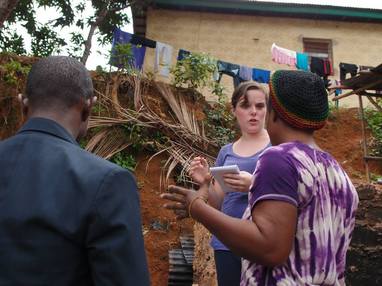 Issy interviews people in Sierra Leone Issy interviews people in Sierra Leone I have just got back from Sierra Leone where I was staying in the capital, Freetown. I was in Freetown for 3 weeks where I undertook a market assessment of Freetown’s improved cookstove market.
The Sierra Leone diet is similar to the Ghanaian diet; Fufu, Tilapia and Groundnut Soup are all common place. Another significant part of Sierra Leone diet are their green stews, made with either cassava leaf or potato leaf, but as I was talking to people about their eating habits, many of the guys would say they didn’t actually like it, which reminded me of my brothers adverse to anything green when we were growing up.
As I headed into town on the first day, I saw a mural which said ‘stop bush fires, stop charcoal burning, respect the law’ which was a little alarming, seeing as I’m here to research stoves that use charcoal. Upon closer inspection, it appeared to be an initiative of USAID and the US Forest Service International Programs. I later learned that there is a ban on charcoal production in Freetown.
Going to the market is always a lot of fun, as there is so much to see and potentially buy, so conducting the market research in the markets of Freetown was always going to be an exciting experience.
The central market in Freetown appeared to be never ending streets of stalls. At first, I was aimlessly walking around trying to find stalls that were selling cookstoves. Eventually I gave in and asked around. The stall holders I spoke to said to head to Ferry Junction, which was in a different part of town. I couldn’t really believe that there wasn’t anyone who sold cookstoves in the centre of town. So I carried on wandering around with the hope of finding something, and it also allowed me to enjoy and see parts of Freetown. I eventually came across a stall selling traditional coal pots. The guy running the stall was called ‘Elder Rider’ (he even had a helmet to prove it). ‘Elder Rider’ was an interesting character. As I approached, he said ‘This is an African store.' I explained what I was doing and after a while he agreed to chat with me. He provided some interesting responses to my questions, and he was a great first interview to get my project started.
I spoke to a variety of Sierra Leoneans, including commercial cooks and caterers. One amazing lady was called Fatimata, and she had a business selling breakfasts and lunches to a large office in Freetown. She would get up at 2am to start cooking, and would leave for the office at 6am to provide the office workers with both breakfast and lunch. She also had to cook for her household of 5 people. I’m not sure if she ever slept!
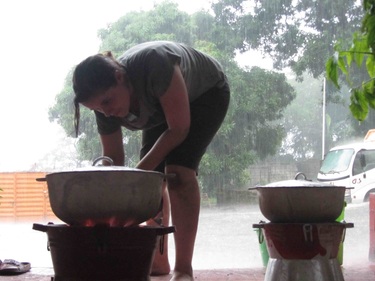 Conducting water boiling tests Conducting water boiling tests As a way of assessing how efficient the existing improved cookstoves that are available in Sierra Leone, I conducted a boiling water test on 3 different types of improved cookstoves and the traditional metal coal pots. I thought this was going to be fairly straight forward task, but it turned into somewhat difficult. I never thought the sight of boiling water would please me so much. Teaching myself how to competently use the cookstoves took some work, so when I finally had boiling water it felt like a huge success.
I have managed to meet with some great characters whilst in Sierra Leone, as well as see some amazing sights. I am now in my final few weeks working with Gyapa Enterprises before I go back to the UK.
We are introducing a new innovative label for our Gyapa fuel-efficient cookstoves. Every stove will have an individual warranty code, which not only allows customers to claim their warranty, but also certifies that they have purchased an Original Gyapa.
In this new commercial, airing late July on Ghana TV, Gyapa cookstove retailer, Rebecca, teaches a customer about the new certified Original Gyapa labels. Video
Watch our new commercial detailing the benefits of our new Gyapa cookstove labeling system (above)
On set
Our own staff member, Agnes Ofosu, stars in the new commercial, accompanied by Rebecca, a retailer who has been selling Gyapa cookstoves for 9 years
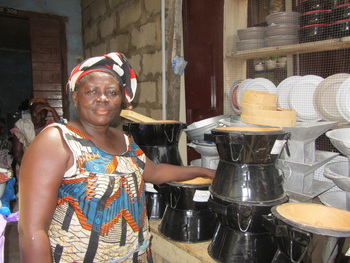 Photo of Gyapa retailer, courtesy of Issy Photo of Gyapa retailer, courtesy of Issy Hey, it’s ‘Issy the Intern.’ I've been kept very busy, and I'm excited to share what I've been up to. My big assignment has been 'mapping' retailers and producers in Ghana by taking photos and tagging them using the GPS function of my camera. I spent the first couple of days in the office getting to grips with the GPS function on my camera and how I could use it in order to create the network map of Gyapa cookstoves. We went to Makola and Madina Market where we met various retailers of Gyapa cookstoves. This was my first experience of a Ghanaian market, having spent the last 4 and bit years living in Brighton, England with their famous South Lanes, I was fairly accustomed to narrow, weaving alleys and walkways, but Makola & Madina Market are on another level. With stock towering over you I’m not sure if someone with claustrophobia would be able to cope. For me, however, it was a great experience. In Makola Market we met two wonderful retailers, Susie and Evelyn, and both gave fantastic interviews. While Carole Lundgren was interviewing them for a supply chain video project, I took photos, which allowed us to post updates on Facebook and Twitter about what we are doing before all the editing is complete. After finishing the interviews with both Susie and Evelyn we went across the city to Madina Market where we interviewed two further retailers and a commercial user. It was great to hear people say such positive things about Gyapa cookstoves, and we will definitely be able to make some cool videos out of the footage we got. We finished the day by going to visit two end users of Gyapa and got interviews with them. It was great to hear opinions of Gyapa from end users, which are not affiliated with the scheme. One of them gave such an amazing testimonial, we couldn’t quite believe it: "Gyapa is the best for every household." On Friday we took the 2 hour journey to Winneba, which is to the west of Accra, to visit Ekem. Ekem produces the clay liners, and this is what makes Gyapa so fuel efficient, as it retains the heat so users do not have to use as much charcoal. It was really interesting to hear what Ekem had to say, as he has worked with Gyapa Enterprises for 10 years and so has been there right from the beginning. He described in great detail the processes behind making the clay liners, which is a critical part of the Gyapa cookstove. I also used this opportunity to gather GPS points. The aim is to plot where all the producers and retailers are, and the aim to plot all the retailers and producers so we can see the distribution of the stoves. It is a great way for everyone to see the impact the programme has had, and is embedded into our website, so that everyone can see that faces of Gyapa! It’s been a great time here in Ghana. I've had some great experiences meeting the various people that are a part of the Gyapa network. I am looking forward to more visits to retailers and producers, because it is these amazing people that make the Gyapa cookstove network so great. See Issy's GPS Google map project on our Impact page: http://www.gyapa.com/impact.html
Meet Mr. Adolph, Regional Marketing Manager in the Ashanti and Brong-Ahafo regions of Ghana. Based in Kumasi, Adolph has worked with Gyapa Enterprises for a year. He not only leads marketing and sales efforts in the region, looking for ways to bring Gyapa cookstoves into new territories, but he also coordinates 3 ceramicists, 46 metal artisans and 90 retailers. In addition to monitoring this value chain, he also helps manage micro-impact investments Gyapa Enterprises makes into cookstove producing parterns' businesses.
When asked about his favorite part of the job, Adolph replied, "I meet a lot of people and we share a lot of experiences. That has given me a great insight into life."
In his interview (above), Adolph discusses his work with Gyapa Enterprises. He also highlights the loan assistance Gyapa Enterprises has provided a ceramicist in our value chain.
Hey, I’m Issy and I’m an intern working with Gyapa Enterprises. I came to Ghana in March, but I had been working remotely from the UK a month prior. The two main focuses of my internship is using GPS and GIS to create a map of all the producers and retailers of Gyapa cookstoves, and also to help develop our various social media channels. I studied Geography at university and developed a keen interest in sustainable development and environmental issues, so I am hoping to increase my knowledge around these subjects and learn about new ones.
Welcome to Ghana.
The first thing that hit me getting off the plan was the heat. I was coming from the UK where snow was forecast - it was a bit of a jump to 25-30C in Ghana! After a long cold winter in the UK, it was very nice to be warm without having to be bundled up in thousands of layers. I arrived on a Saturday, so had the Sunday to sort myself out and get ready for my first day in the office with the team. I spent most of Sunday having a BBQ and smiling to myself as I watched the UK become covered in a blanket of snow.
And the Field Work Begins.
As with any new job, the initial part of the first day is going around the place and meeting everyone, trying to remember everyone’s name. After a whistle-stop tour of the office, it was down to work for my first full day. After a couple of days being office based, researching how other social enterprises use social media, I went out with our driver, Isaac, and Marketing Officer, George, to visit a production site. This was my first chance to see how the Gyapa project works, and it gave me a better idea of what Gyapa Enterprises is all about. It was really cool to see the guys transform scrap mental into the bodies of the Gyapa cookstoves. George told me how each production site makes the handles slightly differently so you can tell where each stove has been made.
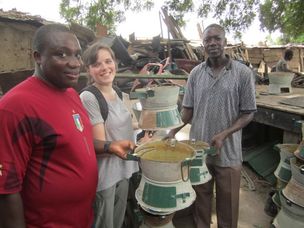 Issy with George and Lucky Issy with George and Lucky This was also where I first experienced the ‘ obruni effect.' Obruni means 'white person' in Twi, the local Ghanaian language, and as we were approaching the site children stayed shouting this at our truck as we rode past. George explained that they were shouting at me. Kids will say this at you whilst passing, almost as if you were a celebrity passing through, and most adults will address you as obruni if they want to speak to you. It is something you soon get used, and comes part in parcel of being an obruni. The visit also allowed me to collect my first lot of photos which we can use for future social media and include in blog posts. This is another aspect of my internship; as photos make such an immediate visual impact, we try and capture as much of what we see when we are out visiting producers and retailers in order to fully depict the Gyapa story. I just hope I have enough space on my laptop for all the images! I really enjoyed my first few weeks in Ghana working with the Gyapa team, and I am looking forward to my time here. I will hopefully learn a lot about social enterprise, social media tactics and relearn GIS. I will be keeping a blog throughout my time here, so keep posted for more updates about my internship and my experiences in Ghana. You can follow Issy's adventures with Gyapa Enterprises in Ghana on our blog, and on her Twitter feed @Issy_01
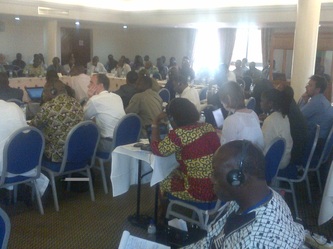 Amavi Bada, Regional Enterprise Development Manager, recently attended the West Africa Clean Cooking Alliance (WACCA) conference in Ouagadougou, Burkina Faso. WACCA is an initiative of The ECOWAS Centre for Renewable Energy and Energy Efficiency (ECREEE). This West African regional organization's main objective is to provide access to efficient, sustainable and affordable cooking energy in the ECOWAS (Economic Community of West African States) region. During the 3-day conference, he's been able to share best practices and challenges on clean cooking and how these challenges are overcome from within the region and beyond. In addition, he's engaged and debated on how to achieve an integration of clean cooking into national energy strategies. As a group, participants are taking the dialogue forward on developing policies and planning tools that promote clean, safe, and efficient cooking as a driver of economic growth and improves environmental and social conditions. The group will end the conference by creating and validating the WACCA Regional Action Plan to set the agenda as a region for the upcoming years.
| There was also a 3-day exhibition that showcased regional and international exceptional products, technologies and services in the area of efficient and clean cooking from West Africa and other regions.
Amavi has had the opportunity to engage and connect with other organizations with a passion for clean cookstoves, and look forward to creating partnerships within the region.
| |
|
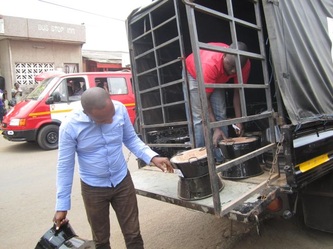
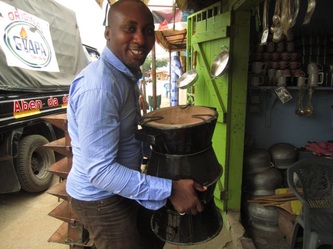
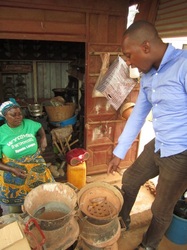
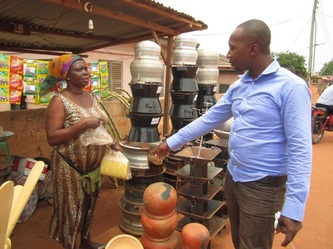
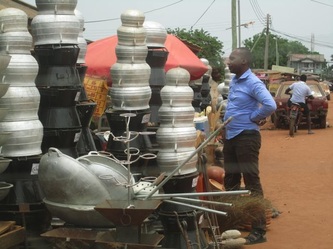
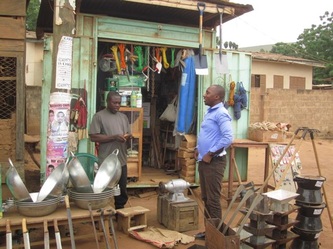
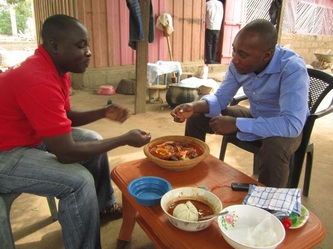
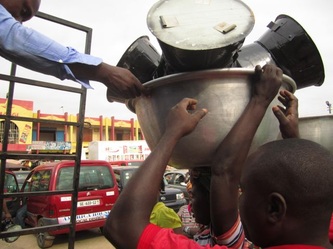
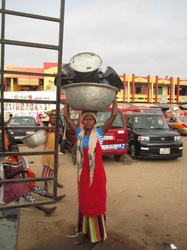


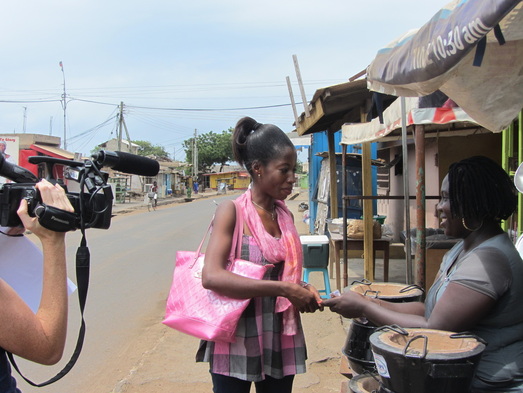



 RSS Feed
RSS Feed
